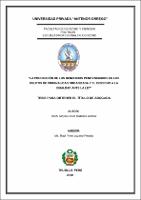La prohibición de los beneficios penitenciarios en los delitos de criminalidad organizada y el derecho a la igualdad ante la ley

View/
Download
(application/pdf: 599.9Kb)
(application/pdf: 599.9Kb)
Date
2019Author(s)
Rabines Gómez, Mayra Lisset
Metadata
Show full item recordAbstract
El presente informe de tesis tuvo como objetivo general el determinar si la
prohibición de los beneficios penitenciarios en los delitos de criminalidad
organizada basada en la teoría de los incentivos vulnera el derecho a la
igualdad ante la ley.
En la etapa de recopilación de información para la elaboración de la dispersión
temática de los capítulos del marco teórico se utilizaron las fuentes de consulta
como libros, revistas, legislación nacional y comparada, jurisprudencia, para
lo cual se utilizó como instrumento de acopio de datos las fichas de registro y
de investigación.
En cuanto a los resultados de la investigación desarrollados en los capítulos
del marco teórico, se tiene que los elementos constitutivos de la criminalidad
organizada son su estructura organizacional piramidal, su permanencia, el fin
lucrativo y ha sido materia de reproche en el derecho comparado; el derecho
de igualdad ante la ley trasciende lo autónomo porque repercute en otros
derechos donde recae el trato desigual, entre sus dimensiones se identifican
e la igualdad en la ley, la igualdad en la aplicación de la ley, la igualdad formal,
la igualdad material, la igualdad como derecho y la igualdad como principio;
su naturaleza jurídica de los beneficios penitenciarios es de incentivos o
estímulos tal como lo regula el artículo 165 del Reglamento del Código de
Ejecución Penal y el artículo 1 de la Resolución Administrativa Nª 297-2011-
P-PJ.
La conclusión principal del trabajo de investigación es que la prohibición de
los beneficios penitenciarios en los delitos de criminalidad organizada basada
en la teoría de incentivos si vulnera el derecho a la igualdad ante la ley, al
constituir normas discriminatorias proscritas por la Constitución Política y los
instrumentos internacionales suscritos por el Estado, por lo que se
recomienda asumir la teoría de los beneficios penitenciarios como derecho
subjetivo del penado como expresión del derecho a la igualdad ante la ley. The general objective of this thesis report was to determine if the prohibition of
prison benefits in organized crime crimes based on the theory of incentives
violates the right to equality before the law.
In the information gathering stage for the elaboration of the thematic dispersion
of the chapters of the theoretical framework, the sources of consultation were
used as books, journals, national and comparative legislation, jurisprudence,
for which the data collection tool was used as a data collection tool registration
and investigation files.
Regarding the results of the research developed in the chapters of the
theoretical framework, the constitutive elements of organized crime are its
pyramidal organizational structure, its permanence, the lucrative purpose and
it has been a matter of reproach in comparative law; the right to equality before
the law transcends the autonomous because it affects other rights where
unequal treatment falls, between its dimensions are identified equality in law,
equality in the application of the law, formal equality, material equality, equality
as a right and equality as a principle; its legal nature of penitentiary benefits is
incentives or incentives as regulated by Article 165 of the Regulation of the
Criminal Enforcement Code and Article 1 of Administrative Resolution No. 297-
2011-P-PJ.
The main conclusion of the research work is that the prohibition of penitentiary
benefits in the offenses of organized crime based on the theory of incentives if
it violates the right to equality before the law, by constituting discriminatory
norms prohibited by the Constitution and the instruments international
agreements signed by the State, so it is recommended to assume the theory
of penitentiary benefits as a subjective right of the prisoner as an expression
of the right to equality before the law
Collections
- Derecho [481]

